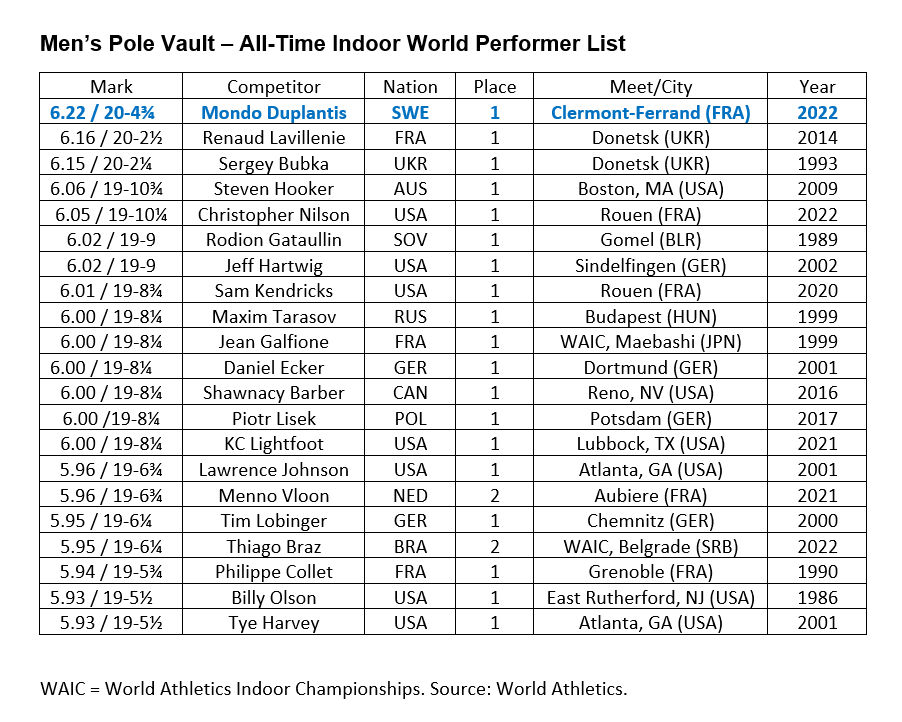Week in Review: Leave it to Duplantis
Pole vaulter extraordinaire delivered world record on day other attempts fell short
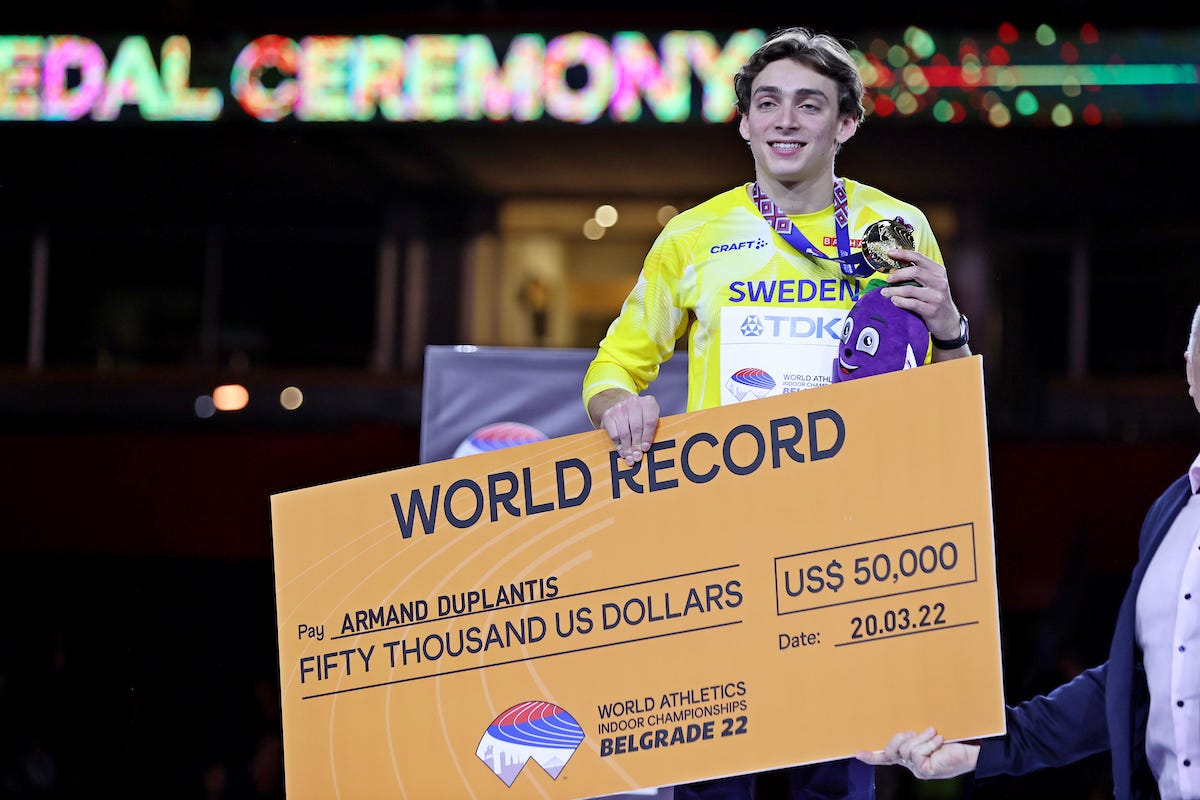
On a day when a trio of record attempts fell short, pole vaulter Mondo Duplantis of Sweden set the sixth world record of his career – and the fourth within the last 12 months – when he cleared 6.22 meters (20 feet 4¾ inches) in the All Star Perche meet in Clermont-Ferrand, France on Saturday.
Competing in front of a capacity crowd of approximately 4,500 people in the Sports House arena, Duplantis cleared his record height on his third – and final – attempt after Gudaf Tsegay, Laura Muir, and Keely Hodgkinson had been unsuccessful in their bids to set world records in the women’s 3,000, 1,000, and 800 meters, respectively, earlier in the day in a meet in Birmingham, England.
The clearance by Duplantis added a centimeter to the world record of 6.21 (20-4½) which he had cleared on his second attempt in the World Athletics Championships in Eugene, Oregon last July. It also came in a pole vault-only meet that was co-founded in 2016 by Ukrainian Sergey Bubka and Frenchman Renaud Lavillenie.
Bubka is regarded by many as greatest pole vaulter in history as he won the 1988 Olympic title and six World outdoor championships, set more than 30 world records – indoors and outdoors – and was ranked as the top performer in the world a record 13 times by Track & Field News.
However, 2012 Olympic champion and five-time World Championship medalist Lavillenie has been a mentor to Duplantis since he first made a name for himself at the international level in 2017 following his junior year at Lafayette High School in Louisiana.
Lavillenie, who tied for fifth in the World Championships last year at the age of 35, was standing on the infield on Saturday when Duplantis sped down the runway on his final attempt at the record height. And he was the first person to congratulate Duplantis with a bear hug after the exuberant Swede had bounced up on the landing mat after making his descent back to earth after clearing the record height.
The two embraced each other so brusquely that they tumbled onto the mat. They then hugged each other a second time after regaining their feet before slapping their right hands together and embracing a third time.
Duplantis then bounded off the mat and embraced his girlfriend for four to five seconds before hugging two more men. He followed that by raising his left arm skyward with his index finger extended and gestured to the crowd on both sides of the track before jumping up and down two or three times and letting out a celebratory yell. He then covered his face with both hands, and in a single motion sat down and rolled onto his back on the pole vault runway before slapping the runway three times with the palms of his hands.
“There’s something about it that just feels overwhelming right now, and I really think it’s because Renaud means so much to me, he’s meant so much to me since I first started, he’s my biggest inspiration, biggest idol,” Duplantis was quoted saying in a post on inquirer.net. “He really motivated me, made me believe that I could break the world record. So for me to break the world record here, his hometown, his competition that he hosts…”
The 6.22 vault came in the fourth – and final – indoor meet of the season for Duplantis and marked the second time he had set a world record of sorts in the All Star Perche meet. The first had come exactly five years earlier when an 18-year-old Duplantis had raised his own world U20 (under-20) record to 5.88 (19-3½) while finishing fifth in a competition that included second-place Lavillenie, who cleared 5.93 (19-5½).
Duplantis cleared 5.71 (18-8¾) on his first attempt of the competition on Saturday before passing the next height of 5.81 (19-0¾). He needed two tries to get over 5.91 (19-4¾) before clearing 6.01 (19-8¾) on his first attempt to win a competition that included second-place Kurtis Marschall of Australia (5.91) and third-place Menno Vloon of the Netherlands (5.91).
He then had the bar raised to 6.22, and after missing his first two attempts, he cleared it with two or three inches (five to seven centimeters) to spare. His height over the bar was not as large as it had been in Eugene during his record jump in the World Championships, but it seemed to indicate that Duplantis is capable of raising the world record to 6.25 (20-6¼) or 6.26 (20-6½) in the next couple of years if he stays healthy and motivated.
“When you have moments like this, when the energy is so high, and you’re going down there for the record, it feels like levitating,” he said, “it feels like my body never even touched the ground the whole jump.”
He later made a comment that does not bode well for the other elite vaulters in the world when he said that the “pressure doesn’t really feel the same anymore to me. I’ve proved a lot over the past few years, the past two years especially, and I know what kind of jumper I am, what I am capable of. I know that I am deserving to be in the spot I am.”
Oh so close: Gudaf Tesgay of Ethiopia came within a tenth of a second of lowering the indoor world record in the women’s 3,000 meters in the World Indoor Tour Final in Birmingham, England on Saturday.
Cheered on by a vocal crowd at Utilita Arena, Tsegay clocked 8 minutes 16.69 seconds to narrowly miss the world record of 8:16.60 set by countrywoman Genzebe Dibaba in 2014.
Fellow Ethiopian Mizan Alem finished second in 8:31.20, followed by Konstanze Klosterhalfen of Germany at 8:35.14.
Tsegay, first in the 5,000 and second in the 1,500 in the World Championships last year, followed two pace setters for the first 800 meters before one of them dropped out and the other came though the first 1,000 meters in 2:43.41.
Well clear of the rest of the field, Tsegay moved into first place by herself shortly after a second pacesetter brought her through 1,600 meters in 4:23.91.
When she came through two kilometers in 5:31.06, her pace projected to a final time of 8:16.59. However, she slowed over the next four laps as she came through 2,400 meters in 6:37.85 after running the previous 400 in 66.79, and she clocked 7:45.18 at the 2,800-meter mark after running 67.33 for last 400.
A world record appeared to be out of reach at that point, but the 25-year-old Tesgay made things interesting by covering the last 200-meter lap in 31.51 seconds.
It was the second time in two and a half weeks that Tsegay had fallen short of a world record held by Dibaba, but she had been nearly three seconds off the mark of 4:13.31 in the mile when she ran 4:16.16 in the Copernicus Cup in Torun, Poland on Feb. 8.
"It was so close," she was quoted as saying in a post on the insidedthegames.com site. "My body is more tired from the travelling, but I am sure that I will get the world record next time."
Not so close: Like Tsegay, Laura Muir of Great Britain entered the World Indoor Tour Final intent on bettering a world record. But unlike her Ethiopian counterpart, she fell well short of the 1,000-meter record set by Mozambique’s Maria Mutola in 1999.
The bronze medalist in the 1,500 in the World Championships, Muir stated before the meet that she felt she “was in a really good spot” when it came to her chances of bettering Mutola’s time of 2:30.94.
Designated rabbit Jenny Selman set the pace through 200 meters in 29.12, through 400 in 58.83 (29.71), and past 600 in 1:29.36 (30.53) before pulling off the track and leaving Muir with a lead of more than 25 meters over her closest pursuer.
Muir, 29, looked strong and full of run as she headed down the backstretch for the second-to-last time, but she grimaced for the first time at the 700-meter mark and began to slow after that as she came through 800 meters in 2:01.36.
Although she was never in any threat of not winning the race, Muir lost much of her lead over the final 150 meters before crossing the finish line in 2:34.53. Claudia Bobocea finished second in a Romanian record of 2:35.35, followed by Sofia Ennaoui with a Polish record of 2:35.69.
“I was going to go for it, and I think when you are running at that pace, it's going to hit at some point,” Muir said in a World Athletics post. “Unfortunately, it hit a bit too soon, but I had to go for it, and I had to run those times at the start.”
British record in women’s 800: Although Keely Hodgkinson of Great Britain did not run as fast as hoped for, she did set a national record of 1:57.18 in winning the women’s 800 meters in the World Indoor Tour Final in Birmingham.
It was the third consecutive race in which the Olympic and World Championship silver medalist had broken 1:58 in the 800 after opening her indoor season with a world best of 1:23.41 in the 600 in a meet in Manchester, England on Jan. 28.
That effort led many, including Hodgkinson herself, to discuss the possibility of her taking a serious crack at the indoor world record of 1:55.82 in the 800 set by Jolanda Ceplak of Slovenia in the 2002 European Championships. But Hodgkinson had pointed out that Ceplak’s mark came at the end of a terrific duel in which she defeated second-place Stephanie Graf of Austria by three hundredths of a second.
Hodgkinson, 20, had not been seriously challenged in her first three races of the indoor season and that was again the case in Birmingham as she won by more than two and a half seconds.
Although the pacesetter did her job by coming through 200 meters in 27.22 seconds and past 400 in 56.94, Hodgkinson was five or six meters behind her at that point. She moved into the lead just before 500 meters and had a lead of more than 20 meters on second-place Isabelle Boffey of Great Britain when she came through three laps in 1:27.56.
She continued to widen her advantage during the last lap, but seemed disappointed with her final time that bettered her previous national record of 1:57.20 and tightened her hold on sixth on the all-time performer list.
Catriona Bisset of Australia finished second in 1:59.83, followed by Boffey in 2:00.25.
“It was pretty smooth running, but the line got away from me towards the end,” Hodgkinson said in a World Athletics post. “I'm a bit gutted because I feel like I'm capable of faster than that, but nevertheless, I'm happy to come away with another British record.”
Deep race: Although there was no talk of a world-record attempt in the men’s 1,500 meters in the World Indoor Tour Final in Birmingham, the race was set up as a British-record attempt and it led to the most competitive and depth-laden event of the meet as the top three finishers set national records and five runners ran under 3:35.
Pace setter Erik Sowinski of the U.S. led the field through 400 meters 56.14 seconds and past 800 in 1:53.53. He was closely followed by Josh Kerr and Neil Gourley of Great Britain, Adel Mechaal of Spain, and Andrew Coscoran of Ireland, in that order.
Sowinski led for most of the next lap before Olympic bronze medalist Kerr took the lead at 1,000 meters in 2:22.35. He led for the next 350 meters, but Gourley shot by him going down the backstretch for the final time and Mechaal and Coscoran followed suit.
That trio maintained their positions for the remainder of the race as Gourley’s 3:32.48 moved him to eighth on the all-time performer list and lowered Kerr’s previous British record of 3:32.86 that he had run on his way to a national record of 3:48.87 in the indoor mile last year.
Mechaal’s 3:33.28 clocking in second place trimmed four hundredths of a second off the Spanish record of 3:33.32 set by Andres Diaz in 1999. Coscoran’s third-place time of 3:33.49 smashed the official Irish record of 3:36.64 set by Marcus O’Sullivan in 1989, although it should be noted that Eamonn Coghlan had to have come through 1,500 meters in a time significantly faster that O’Sullivan’s mark when he set a then-indoor world record of 3:49.78 in the mile in 1983.
Kerr finished fifth in the race on Saturday in 3:34.93 after being overtaken by Luke McCann of Ireland (3:34.76) in the last 20 meters of the race.
"That race was something else," said the 28-year-old Gourley. "I knew it was going to be quick, it was a case of hanging on and using my pace in the last 150 and thankfully I managed to do that."
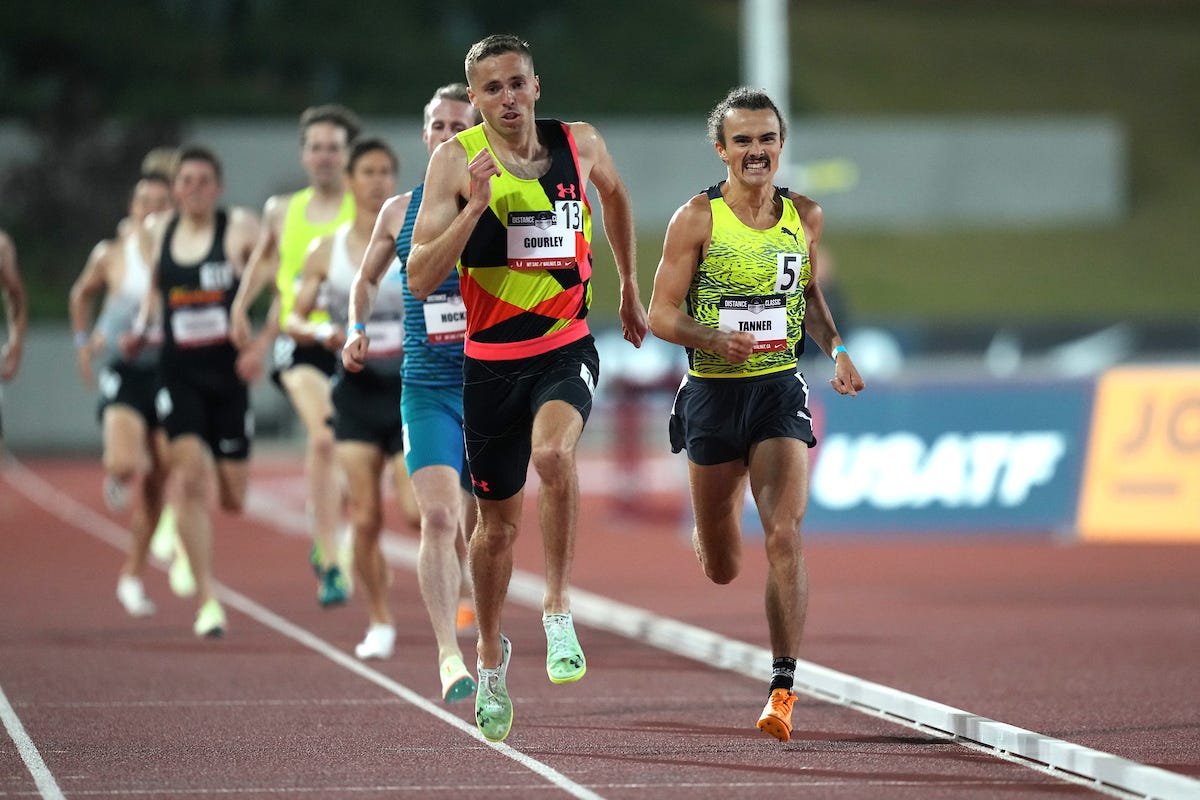
Still the king: Daniel Roberts had become the 14th man in history to break 7.40 seconds in the 60-meter high hurdles on Feb. 22 when he ran a winning 7.39 in a meet in Madrid, Spain. But fellow American Grant Holloway stormed away from Roberts and the rest of the field in the World Indoor Tour Final in Birmingham.
Roberts managed to stay close to the typically fast-starting Holloway for the first three flights of hurdles, but Holloway had opened up a lead approaching the fourth hurdle and he took command of the race after Roberts banged the fourth of five barriers.
Holloway’s time of 7.35 was the fastest in the world this year and tied for the eighth fastest time in history. It was also his 61st consecutive victory in the event.
Roberts finished second in 7.47, followed by Roger Iribarne of Cuba at 7.58.
Holloway, the two-defending World champion in the 110-meter high hurdles, has now run 8 of the 11 fastest times in history in the 60-meter event, including a pair of 7.29 clockings that are the fastest ever.
That’s a wrap: Yared Nuguse of the U.S. capped off a short, but incredibly productive three-race indoor season with a winning time of 3:33.69 in the men’s 1,500 meters in a World Indoor Tour meet in Madrid, Spain on Feb. 22.
The 23-year-old Nuguse, who had run American records of 7:28.24 in the 3,000 on Jan. 27 and 3:47.38 – the No. 2 performance in history – in the mile on Feb. 11, was close to pace setter Erik Sowinski when he went through 400 meters in 54.84. But he was five or six meters behind Sowinski when the 800 mark was passed in 1:52.09.
Nuguse took over the lead after Sowinski dropped out just before 1,000 meters. He would hold the lead for another lap or so before Spain’s Mohamed Katir led the field through 1,200 meters in 2:51.60.
Katir, who had run 7:24.68 in the 3,000 – the No. 2 performance in history – while finishing second to Lamecha Girma’s world record of 7:23.81 a week earlier, maintained the lead until the final straightaway when Nuguse sped past him to win the race by a comfortable margin. Katir ran 3:34.32 in second place, followed by countryman Adel Mechaal (3:34.82) and Grant Fisher (3:34.99 personal best), the American record-holder in the 3,000, 5,000, and 10,000 outdoors.
“I felt pretty good,” Nuguse said in an interview with letsrun.com. “It went out on a pretty hot start. And I was kind of just like trying to stay calm regardless of that. Just see how things would go. And Katir ended up passing me, but I still felt pretty good and I was able to kind of pull something out at the end. So fast race, great competition… really happy with how it went.”
Great start to the outdoor season: Ferdinand Omanyala produced an eye-opening trio of times in the men’s 100 meters in the two-day Athletics Kenya Weekend Meeting competition in Nairobi last Friday and Saturday.
The 27-year-old Kenyan, who had lowered his 60-meter national record to 6.54 seconds on Feb. 15, ran 9.86 for 100 meters in a first-round heat at Nyayo National Stadium last Friday. He then clocked 9.96 and 9.81 in the semifinals and final, respectively, on Saturday.
The 9.81 clocking was the second fastest of his career and gave him a comfortable margin of victory over second-place Samuel Imeta, whose 9.94 effort made him the second Kenyan in history to have run under 10.00 in the 100.
The out-going Omanyala told athletics.co.ke after his 9.86 clocking that “The level of fitness I have so far; it is so good that nobody can beat me.”
He added that “This time, it is me against time. I want to run all the way to the top and continue to lower my time.”
The question now is can Omanyala produce these types of performances outside of Kenya during the summer and in the World Championships in Budapest, Hungary in August.
That is a legitimate question for a couple of reasons.
First, Omanyala did not qualify for the final of either the Olympic Games in 2021 or in the World Championships last year, although he was placed at a competitive disadvantage last summer when visa issues led to him arriving in the U.S. only a few hours before the first-round heats of the 100 were held.
Second, he has run five of the six fastest times of his career in Nairobi, where the elevation of 1,661 meters (5,450 feet) aides performances in the sprints, hurdles, and jumps.
Big performer in big meets: If Omanyala is looking for advice about how to perform well in global championship meets, he might want to speak with Akani Simbine.
The 29-year-old South African’s personal best of 9.84 seconds in the 100 is slower than Omanyala’s 9.77. But Simbine is the only sprinter in the world who has advanced to the finals of the last two Olympics and the last three World Championships.
He finished fourth in two of those meets and fifth in three others, including the World Championships last year.
Record rampage continues: For the seventh consecutive week, at least one collegiate record was broken last week. But for the first time this season, a collegiate record was broken twice in the same event on the same day.
That occurred Saturday.
First, Rhasidat Adeleke of the University of Texas ran a collegiate – and Irish – record of 50.33 seconds in the women’s 400 meters in the Big 12 Conference Championships in Lubbock, Texas.
Then, about 30 minutes later, Talitha Diggs of Florida bested that mark with a 50.15 American record in the Southeastern Conference Championships in Fayetteville, Arkansas.
Running in the second of two final heats, Adeleke ran even with Texas teammate Kennedy Simon for the first 100 meters of the race before opening up a substantial lead over the following 200. Simon managed to close her deficit during the final 70 meters of the race, but Adeleke had plenty of room to spare as she defeated Simon (51.01) by nearly seven tenths of the second.
Adeleke’s time trimmed a hundredth of a second off the previous collegiate record of 50.34 set by Kendall Ellis of USC in the 2018 NCAA Championships, and bested her previous Irish record of 50.45 set in the New Mexico Collegiate Classic in Albuquerque, New Mexico three weeks earlier.
Diggs, the defending NCAA indoor and outdoor champion in the 400, had run indoor bests of 7.14 in the 60 and 22.61 in the 200 earlier this season and her improvement in those events seemed to pay dividends in the 400 on Saturday as she slashed more than eight tenths of a second off her previous indoor best of 50.98 while besting the previous U.S. record that Ellis had run in the 2018 NCAA meet.
Diggs was closely pursued by Amber Anning of Arkansas for most of the race before she pulled away in the final home straightaway while moving into a tie for eighth on the all-time performer list.
Anning, whose time of 50.68 moved her to ninth on the all-time collegiate list, is known for her strong finish, but Diggs powered away from her over the final 50 meters of the race while vigorously pumping her arms.
Joining the sub-7 club: Julien Alfred of Texas became the 15th sprinter in history to break seven seconds in the women’s 60-meter dash when she lowered her collegiate record to 6.97 in the Big 12 Conference Championships at Texas Tech University on Saturday.
The defending NCAA champion in the 100, Alfred got off to one of her typically great starts and won by nearly two tenths of a second as Rosemary Chukwuma of Texas Tech and Ezinne Abba of Texas finished second and third with identical times of 7.17.
It was the third collegiate – and St. Lucian – record of the season for Alfred, who had run her previous bests of 7.02 and 7.00 in meets at the Albuquerque Convention Center, site of the NCAA Indoor Championships from March 10-11.
Alfred, whose 60 time moved her into a three-way for eighth on the all-time performer list, later won the 200 in a St. Lucian record of 22.26 that was the third-fastest time in collegiate history behind 22.09 and 22.16 clockings by Abby Steiner of Kentucky last year.
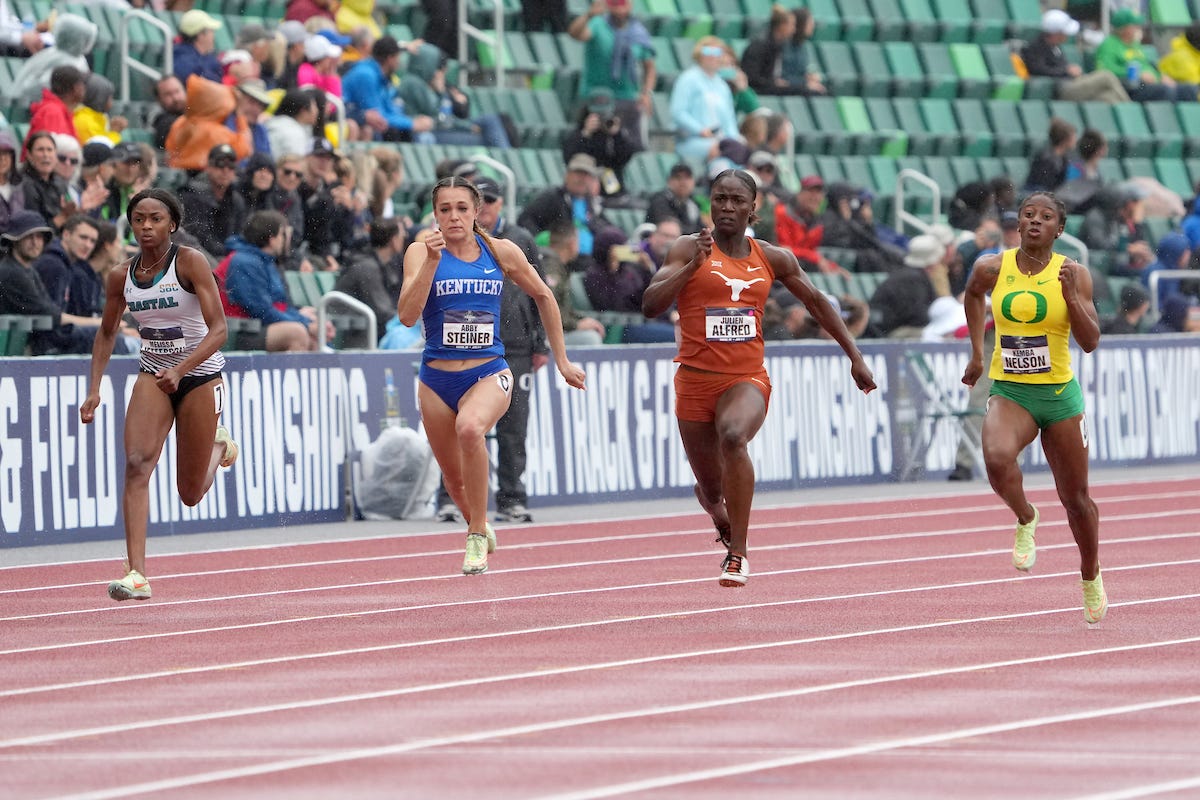
Another sub-7.80 clocking: Masai Russell of Kentucky ran the second-fastest time in collegiate history when she clocked 7.77 seconds to win the Southeastern Conference title in Fayetteville, Arkansas on Saturday. But you could make an argument that her 7.77 effort is superior to her 7.75 clocking from earlier this year because that time was run in the Red Raider Invitational in Lubbock, Texas, where the elevation of 3,217 feet (980 meters) is known to aid performances in the sprints, hurdles, and jumping events.
In contrast, the elevation of Fayetteville is roughly 1,800 feet (550 meters) lower than Lubbock.
Russell, who has run the two fastest times in the world this year, received a serious challenge from Ackera Nugent of Arkansas, who placed second in 7.81 to move into a tie for fourth on the all-time collegiate performer list.
Add 60-meter hurdles: Alia Armstrong of LSU, who won the NCAA title in the women’s 100-meter hurdles last year before placing fourth in the World Championships, never ended up running the 60-meter hurdles indoors this season due to hamstring issues.
On a related topic, defending NCAA indoor champion Grace Stark of Florida did not qualify for the final of the SEC meet. She is working her way back from a tibial plateau fracture in her left leg that she sustained when she fell in the final of the 100 hurdles in the SEC Championships last May.
Four for the 400: The SEC had the four fastest men’s 400-meter performers in the world this year at the conclusion of its conference championships on Saturday.
That came to fruition after Jacory Patterson defeated Florida teammate Ryan Willie, 45.05 to 45.15, to win the first section of the 400, and Elija Godwin of Georgia bested Christopher Bailey of Arkansas, 44.75 to 45.13, to take the second section.
Godwin, Patterson, and Willie all set personal bests, while Bailey’s clocking was the second fastest of his career to a then-yearly world leading time of 45.09 he ran in winning the Razorback Invitational on Jan. 28.
Patterson followed up his runner-up finish in the 400 by defeating Matthew Boling of Georgia for the 200 title less than an hour later.
He clocked 20.29 – to Boling’s 20.44 – and is expected to only contest the 200 in the NCAA Championships.
Long jumpers: Cameron Crump of Mississippi State and Wayne Pinnock of Arkansas moved to second and third on the yearly world list in the men’s long jump with their performances in the Southeastern Conference Championships.
Crump leaped 8.39 (27-6½) to move to fifth on the all-time collegiate performer list.
Pinnock, the defending NCAA indoor and outdoor champion, leaped a personal best of 8.31 (27-3¼) to move to ninth on the all-time collegiate list.
A World Championship finalist for Jamaica last year, Pinnock reached 8.31 on his second attempt before passing his final four jumps of the competition.
Crump was in third place at the end of the fourth round with a best of 8.11 (26-7¼) before he uncorked his 8.39 effort on his fifth attempt.
Defending Olympic champion Miltiadis Tentoglou of Greece tops the yearly world list with a best of 8.41 (27-7¼).
Double trouble: Jasmine Moore of Florida won the women’s long jump and triple jump in the Southeastern Conference Championships with bests of 6.91 (22-8) and 14.09 (46-2¾), respectively.
Moore, the defending NCAA indoor and outdoor champion in both events, moved to second on the all-time collegiate performer list in the long jump with her 6.91 effort in the first round. She also had jumps of 6.86 (22-6¼) and 6.64 (21-9½) on her second and third attempts before passing her final three jumps.
The collegiate record of 6.93 (22-9) was set by Tara Davis of Texas in 2021.
Calm before the storm: Ayden Owens-Delerme of Arkansas won the men’s heptathlon in the Southeastern Conference Championships two weeks before he and Kyle Garland of Georgia are expected to clash in a highly anticipated matchup in the NCAA meet.
Delerme, who edged Garland for the NCAA heptathlon title last year, totaled 6,237 points in the SEC meet.
The Puerto Rican record-holder produced marks of 6.77 seconds in the 60-meter dash, 7.70 meters (25-3¼) in the long jump, 14.76 (48-5¼) in the shot put, and 1.92 (6-3½) in the high jump on Friday. He began Saturday by running 7.80 in the 60 high hurdles, before clearing 4.75 meters (15-7) in the pole vault, and running 2:36.45 in the 1,000 meters.
Garland, who finished sixth in both the 60 high hurdles (7.77) and long jump (7.95/26-1) in the SEC meet, totaled 6,415 points in the heptathlon in the Texas Tech Invitational and Multis meet in late January. That score moved him to second on the all-time collegiate performer list and into a tie for eighth on the all-time world list.
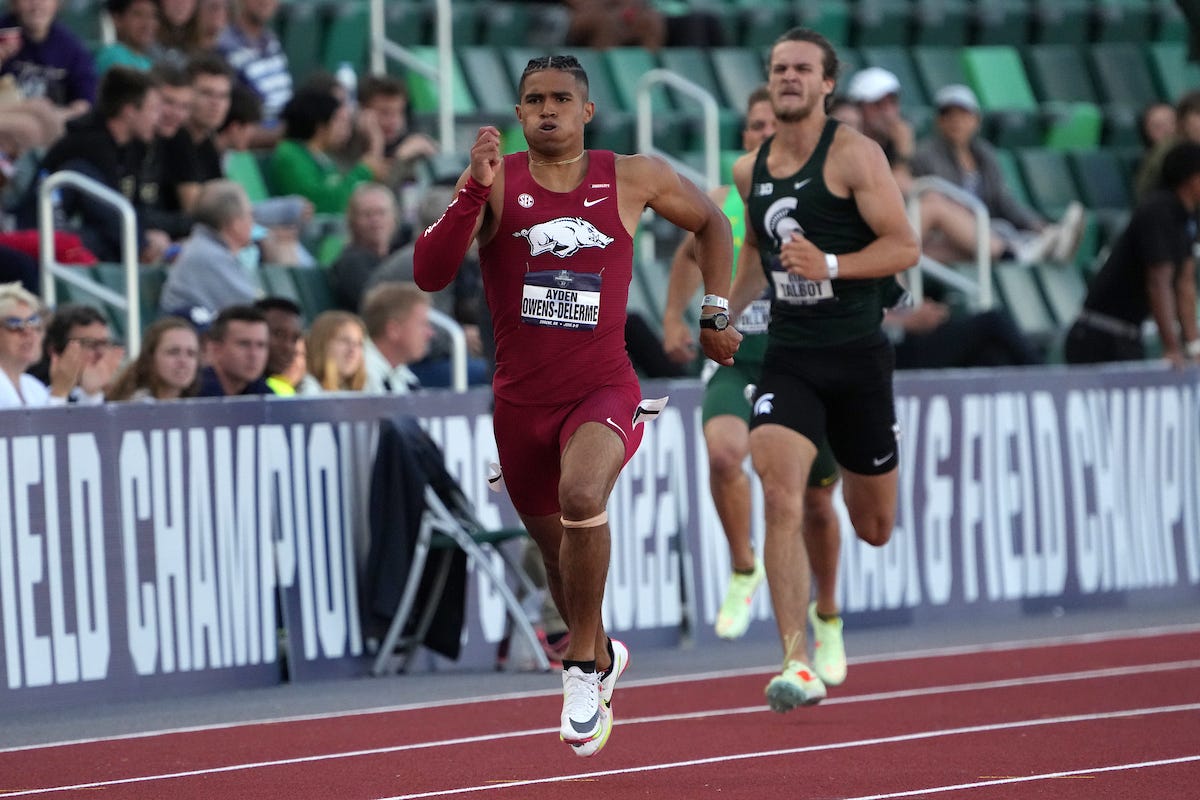
Fast deuce: Courtney Lindsey of Texas Tech was another sprinter who turned in a notable performance in the Big 12 Conference Championships in Lubbock, Texas.
Competing on his home track, Lindsey clocked 20.13 seconds to move to fifth on the all-time collegiate performer list and to sixth on the all-time world list.
Although Frankie Fredericks of Namibia set the indoor world record of 19.92 in the 200 in 1996, the event has not been contested very often at the post-collegiate level for many years.
Two liners: Fred Kerley of the U.S. ran 20.32 seconds to win the men’s 200 meters in the Maurie Plant Meet in Melbourne, Australia last Thursday. The World 100 champion trailed Australian Rohan Browning coming off the curve before taking control of the race and easing up during the last 30-35 meters. . . . Dina Asher-Smith of Great Britain lowered her own national record in the women’s 60-meter dash in the World Indoor Tour Final held in Birmingham, England on Saturday. The World Championship 200 bronze medalist ran 7.03 in her qualifying heat to cut a hundredth of a second off her previous national record before winning the final in 7.05. . . . Marquis Dendy of the U.S. won the men’s long jump on the final leap of the competition in Birmingham with a season best of 8.28 (27-2). Tajay Gayle of Jamaica, the 2019 World champion, had taken the lead minutes earlier when he leaped 8.13 (26-8¼) on his sixth – and final – effort. . . . Geordie Beamish of New Zealand ran a personal best of 3:51.22 to post the fastest time in the men’s mile in the Last Chance Indoor Qualifier meet at Boston University on Sunday. Beamish outkicked American Sam Prakel (3:51.25) in the second elite heat after Henry Wynne edged fellow American Cooper Teare, 3:52.51 to 3:52.56, in the first heat. . . . Sinclaire Johnson of the U.S., sixth in the women’s 1,500 in the World Championships last year, won the 3,000 in a personal best of 8:37.83 in the Last Chance Indoor Qualifier meet in Boston. Johnson originally planned to run in the 3,000 in the World Indoor Tour Final in Birmingham, England on Saturday, but flight issues led her to compete in Boston.
New dates on tap: The 13th edition of the African Games has been postponed until March of next year due to a variety of factors.
The multi-sport competition, which includes track and field, had been scheduled to take place in the Ghanaian cities of Accra, Kumasi, and Cape Coast from August 4-19 of this year. However, a disagreement among stakeholders over marketing rights had played a part in the refurbishment and construction of some sporting venues falling behind schedule.
The postponed event is now scheduled to be held from March 8-23 of 2024.




